Jeff’s Initial Statement: Moon Knight #1-12 is a series of comic books by Brian Michael Bendis, Alex Maleev, Matt Hollingsworth, and Chris Eilopoulos, published in 2013 by Marvel and currently available on its service, Marvel Unlimited.
Jeff’s Initial Disclosure Regarding Brian Michael Bendis: I was once a fan of Brian Michael Bendis’ work, not so much Fire and Jinx and Torso (although I had all those), but Powers and Ultimate Spider-Man and Daredevil. At a certain point, however, perhaps twenty or so issues into his Avengers run, a certain dissatisfaction with Bendis’s working habits became a more quarrellous form of discontent. And after the publishing schedule on Powers became erratic, after Brian Michael Bendis left Daredevil, and after Ultimate Spider-Man began to feel moribund (post issue #120 or so), I stopped buying Brian Michael Bendis’ work, and would only occasionally check it out on the stands to see if that discontent remained.
(Additional necessary disclosures and review after the cut.)
Jeff’s Disclosure Regarding Alex Maleev: I like his work just fine, albeit with certain exceptions I will likely detail below.
Jeff’s Disclosure Regarding Matt Hollingsworth: I met Matt Hollingsworth once, during the course of an afternoon at Comix Experience. I had some of his home-brewed beer, which was exceptional, and I found him a pleasant, down-to-earth conversationalist. Additionally, I think he is in the very top rank of colorists in the field, someone who frequently improves the work of the artists he colors to a significant degree.
Jeff’s Disclosure Regarding Chris Eilopoulos: I have no strong opinions about Chris Eilopoulos’s lettering, apart from occasionally wondering if my own handwriting might have ended up better if my last name has as many letters in it as his. About his work as a cartoonist and creator, my opinions on this subject should have no influence on the review at hand.
Jeff’s Disclosure Regarding The Character, Moon Knight: My first encounter with Moon Knight was in issues #28 and #29 of Marvel Spotlight, the latter of which featured both a cover by Jack Kirby and an example of the “giant chess board of danger” motif, and therefore was doubly irresistible to me on an unconscious level.
At this point, Moon Knight had appeared in a few issues of Werewolf By Night—which I hadn’t read at the time, but would probably less than a year or so later—and his appearance in these issues are a little more refined than in the originals, despite being by the same creative team of Doug Moench and Don Perlin. (By which, I mean that, if memory serves, Moon Knight was a little more of a thug in his first appearances in Werewolf by Knight Night, an anti-heroic figure who was a viable villain for Werewolf By Night because he used cestus, those wicked spiked gladiatorial gloves, made from silver?)
As was the case with an appalling amount of my reading at the time, I enjoyed these first two issues of Moon Knight by Moench and Perlin in an unironic way, taking the character completely at face-value. (I was ten.) Only later, in 1980, when the character got his own series by Moench and Bill Sienkewicz did some of the character’s debt to Batman become clear—wealthy playboy with world-traveling past who flaps about in the night with an extremely long cape, a certain dubiousness with regard to the character’s sanity, “Dark Knight” as opposed to “Moon Knight,” etc., etc.. But on first encounter, I dug him because (a) Perlin drew him with Spider-Man’s eyes; (b) a bite from Werewolf By Night gave him super-strength that waxed and waned depending on the phases of the moon; and (c) Moon Knight didn’t just have one alter-ego, he had three, which kind of went with the whole “phases of the moon” thing. In fact, even to my mind now, Moon Knight is a pleasingly cohesive superhero in the classic sense: each bit of business about the character—from his helicopter to his multiple personalities to his changing super-strength—built off the lunar conception of the character in an unexpected way.
Jeff’s Disclosure Regarding Preconceptions of Moon Knight #1-12, Prior to Reading: My preconception of this book was that it was intended to be an ongoing series but wrapped up as a “miniseries” when its sales levels did not justify the ongoing participation of Bendis and/or Maleev. My preconception of the book was that Moon Knight, a superhero with what we used to call Multiple Personality Disorder, now had three new primary personalities: Captain America, Wolverine, and Spider-Man. I thought this idea was an exceedingly dumb one, and typical of the current regime at Marvel, in that it was so obvious in its attempt to pander to their audience that it wished to be seen as a parody of pandering to their audience. (See, for example, the many, many Deadpool spin-off books from around the same time.)
Disclosure of Publicity Material Consulted: I attest I consulted no publicity material—neither interviews, nor previews, nor social media entries from any of the involved creative parties—regarding this book before, during, or after the time of publication.
Final Pre-Review Statement Regarding the Reading of This Material: I admit I read this material expecting to dislike it, to dislike the creators’ take on the material, and with the intention of mocking it at a later date, either in the podcast or here on the website.
—–Review Begins Below—-
MOON KNIGHT #1-12: Ugh, where to begin? I knew I was in trouble when the first few pages are a very badly written recreation of a key moment in Moon Knight’s origin which turns out to be —reverso!—a scene from a TV show, Legend of the Khonsu, of which Marc Spector, Moon Knight alter-ego, is the creator and executive producer.
If nothing else, I think the ol’ “no, this is deliberately bad” trick requires that the creative material coming after the bad material not be equally tone-deaf.
Bendis and Maleev’s follow-up scene has Spector be toasted at a screening party and flirting with an attractive blonde before being summoned outdoors by Cap, Spider-Man, and Wolverine. The pages of the screening party drawn by Maleev clearly show more than a dozen people mingling in groups of two or three. But Bendis has a speech panel coming from the group of minglers on the far right making it seem like the woman in that group isn’t just talking to friends with a glass of wine in hand but is actually toasting Spector: “Ladies and gentlemen, a toast. To the man of the hour, the creator of what will be the most successful syndicated strip action adventure show since Xena, Warrior Princess…”
See what I mean? Even if I try to be generous by saying, “well, the idea is that the speech, even though it starts at mid-point on the page, actually starts being said by the woman when you get to her at the end of the ‘pan’ across the room, so people were mingling *before* she did her toast to Spector.” (And boy what a long breath that requires….) The next two panels have people looking away in the opposite direction of Spector and the woman toasting him. The artist and the writer are at cross-purposes here.
Also, are you familiar with hearing “syndicated strip” in conjunction with a TV show? I admit I wasn’t, but it caught my eye, since the term has a particular meaning for me as a comic fan. So I went to Wikipedia where I got this fun fact:
The most common form is known as strip syndication or daily syndication, when episodes of a television series are shown daily five times a week in the same time slot.
Okay. Real TV term that TV people might use. However:
Typically, this means that enough episodes must exist (88 episodes, or four seasons, is the usual minimum, though many syndicators prefer a fully rounded 100 episodes) to allow for continual strip syndication to take place over the course of several months, without episodes being repeated.
Legend of the Khonsu is probably not a show that has dozens of episodes in the can. (Spector is rich, but not that rich). It’s possible that “strip syndication” is a generic term for all shows in syndication but it’s more likely that, like Xena, Legend of the Khonsu is a “first-run syndicated program,” as those do not require enough episodes in the can for daily showings. They’re shown weekly.
So. We have a deliberately bad scene opening the book, followed by a scene where the writer and artist are at cross-purposes and the writer uses a distracting term incorrectly. Great.
If you read all of the disclaimers above, I think it’s pretty easy to see how all of my biases are in play here. I don’t have faith in Bendis as a writer, and I liked the original Moon Knight which he’s bagging on here (the other scene shown from the show involves a werewolf). I could be mistaken in my assumption that Bendis is mocking previous iterations of the character, if not explicitly the character himself: if nothing else, why would Marvel’s most successful writer either put himself on the book or consent to be put on the book of a character he’s so dismissive of?
Sadly, I am at this point so distrustful of the guy I can see him taking this book on in precisely such a fashion because: (a) he wants to work with Alex Maleev on a book again, and Maleev wanted to draw Moon Knight; (b) earlier that same year, Fraction and Aja’s Hawkeye debuted to considerable acclaim and Bendis wanted to mimic/top his best friend’s accomplishment; (c) Bendis wanted to show he could make people sit up and take notice of any character he wrote, no matter how lame (a.k.a. the “Jack Kirby ‘Give me your poorest selling book'” Theory); and/or (d) Bendis really believed in this hook he had for the character, the conceit that Moon Knight’s MPD would manifest as three of Marvel’s most iconic heroes. (Hopefully, I arranged those items properly along the fraternity-to-hubris axis.)
Over the course of twelve issues, we have:
(a) Moon Knight dressing up as Spider-Man to start a fight in a strip club;
(b) the appearance of Echo, a character created by Bendis and David Mack, who is deaf and reads lips and is therefore perfectly suited to team up with a character whose mouth is completely obscured (which Bendis hangs a lantern on by having her say “take off your mask so I can read your lips!” a lot) and drawn by an artist who likes to position her facing away from a person’s face when she speaks.
(c) Moon Knight dressing up as Bullseye and torturing a potential employee to test their loyalty;
(d) Moon Knight and Echo beating the crap out of the Night Shift and then getting caught by the police because Echo can’t hear the sirens and can’t see Moon Knight passively standing there telling her “we have to go” because his mask is covering his face and of course he’s just going to stand there saying the same thing over and over without approaching her or waving at her or anything because how ya going to get a cliffhanger if people act like actual people;
(e) Moon Knight and Echo escaping from the cops, followed by Moon Knight kissing Echo, followed by Echo violentely punching him four times in the face, followed by Moon Knight asking “will you marry me?” as she runs off, followed by Moon Knight smiling ruefully and saying, “Look at me. Brave guy making jokes to a deaf girl behind her back” (instead of wondering if the reason why Echo treated like the perpetrator of a sexual assault was because she felt sexually assaulted);
(f) and on, and on, and on.
The villain behind everything is Count Nefaria, who we are told repeatedly is a “Thor level” bad guy but doesn’t do much more than fly around and shoot rays out of his eyes. Madame Masque shows up to beat up Moon Knight and Echo. Last issue cliffhangers play off the idea that Moon Knight is the guy driving the bus, narratively speaking, and the guy driving the bus is crazy. There’s an issue filled with flashbacks where Moon Knight gets his ex-SHIELD agent employee to build him webshooters, claws, and a shield, at the end of which the employee figures out who the voices might be in Moon Knight’s head. (This scene is especially obvious in a painful way.) Someone close to Moon Knight dies which inspires him to fight on against impossible odds. You get the idea, although it’s hard to really convey the fascination of watching someone write a comic book about a superhero with MPD when the person clearly doesn’t care about either the superhero or MPD. Although I don’t think Bendis consciously sat down to write a book that paints people with MPD as dangerous, unreliable, and violent, his utter laziness allowed him to construct a narrative that hammers homes those points repeatedly. If pressed, I’d say Bendis is trying to write something that kinda reminds him of Drive, something deliberately unsettling and odd. It’s a little bit like that old Mike Baron book, The Badger, but neutered and fat and unsurprising and easily self-pleased.
Was there anything at all worthwhile in the book? Yes. I gotta say Alex Maleev’s art featuring the character is genuinely lovely. I hadn’t thought of Maleev as a kind of Sienkiewicz clone, but clearly he and Hollingsworth are using Billy The Sink’s interpretation as a guide, mixing thick black inks and primary colors for when MK is being a brutal warrior, and an ethereally thin line and more varied colors for scenes of the character gliding out into the night. It’s a lot less visceral than Sienkiewicz—not only can you not replicate the initial shock of watching that guy’s ambition swell up like The Hulk and break everything in sight, Sienkiewicz was also restless and willing to throw in anything to keep himsefl from getting bored–but it’s more refined. I liked it.
Also, 2015 is the year Jeff gets in touch with his inner romantic as it pertains to his comic reading, and Maleev is pretty good at attractive people being attracted to each other. And despite my frustration with Bendis here, his ear hasn’t entirely turned to tin: every once in a while, he’ll have a bit of business like a policeman under fire hollering “somebody call somebody” that hits that Tarantino/Mamet sweet spot.
And he does craft at least one scene that justifies his conceit: while trying to escape the police, Moon Knight is hammered on all sides by his three personalities, each of whom has a different and inflexible take on how to handle the authorities. If the book had featured more scenes like that, I would’ve been a lot less disappointed in Bendis here than I was. As it is, between this and Age of Ultron (which he wrote next, but which I read prior to this), I’m really okay with never reading anything by the guy ever again. Smug complacency doesn’t sit well on anyone, but it’s especially ill-fitting on a creator with so many bad and lazy habits.
The Verdict in The Case of Jeff vs. Moon Knight #1-12: Bendis not only managed to take the fun out of hate reading this, but he made me hate myself a little for mostly wasting my time. I hereby sentence myself to forty hours of manga.
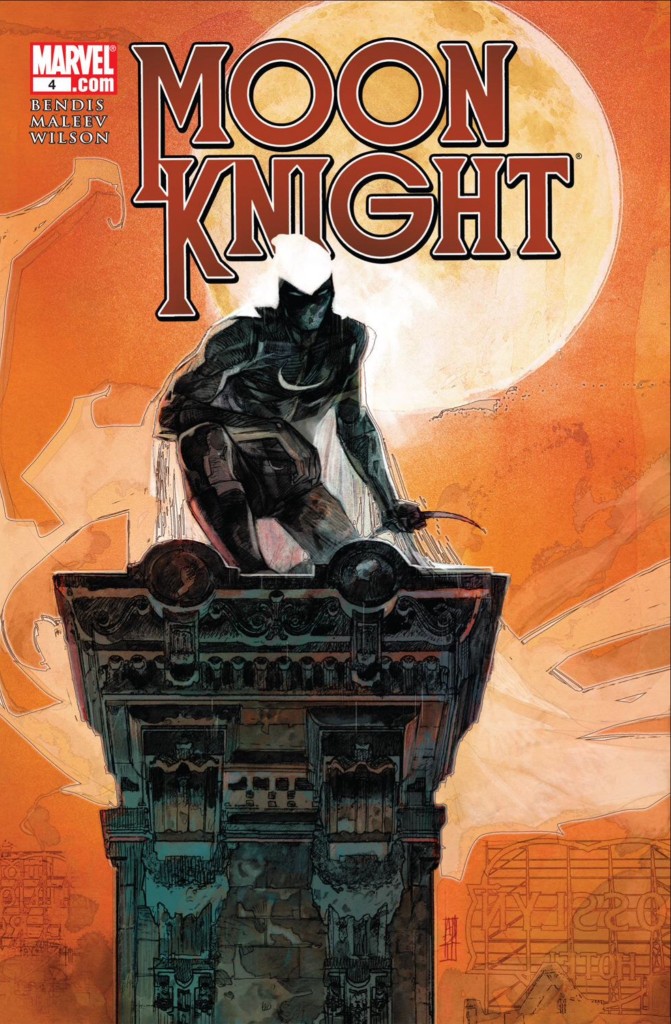
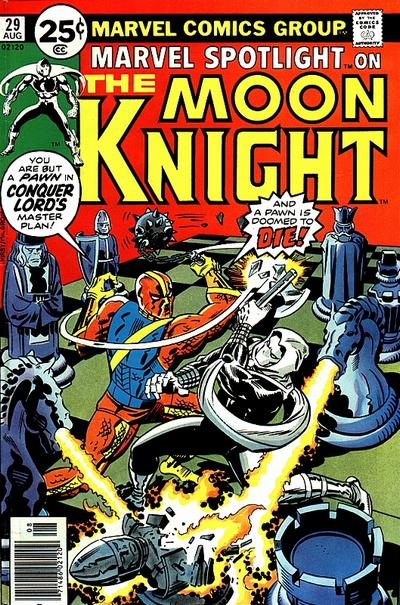
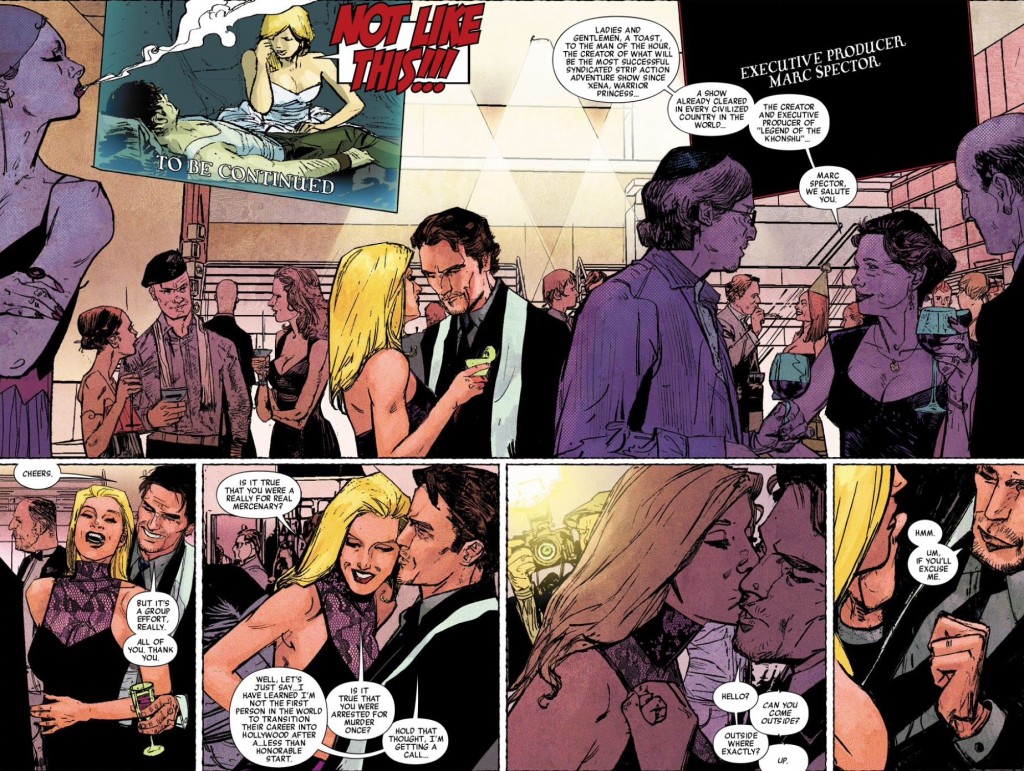
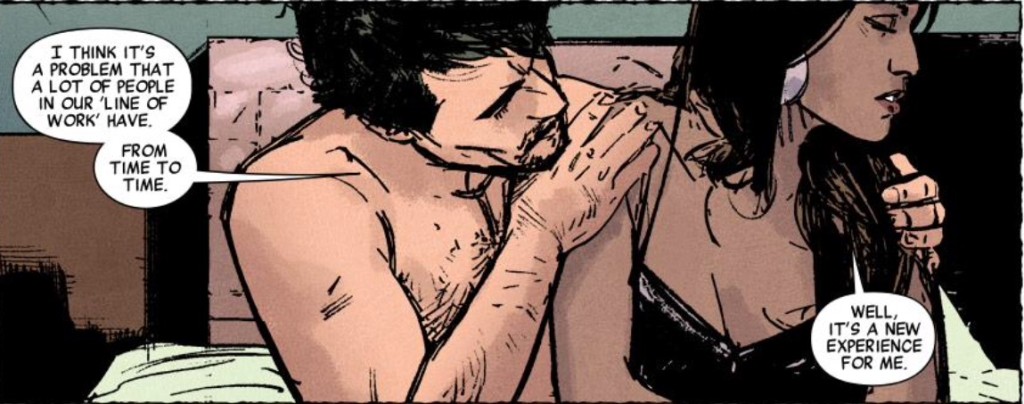
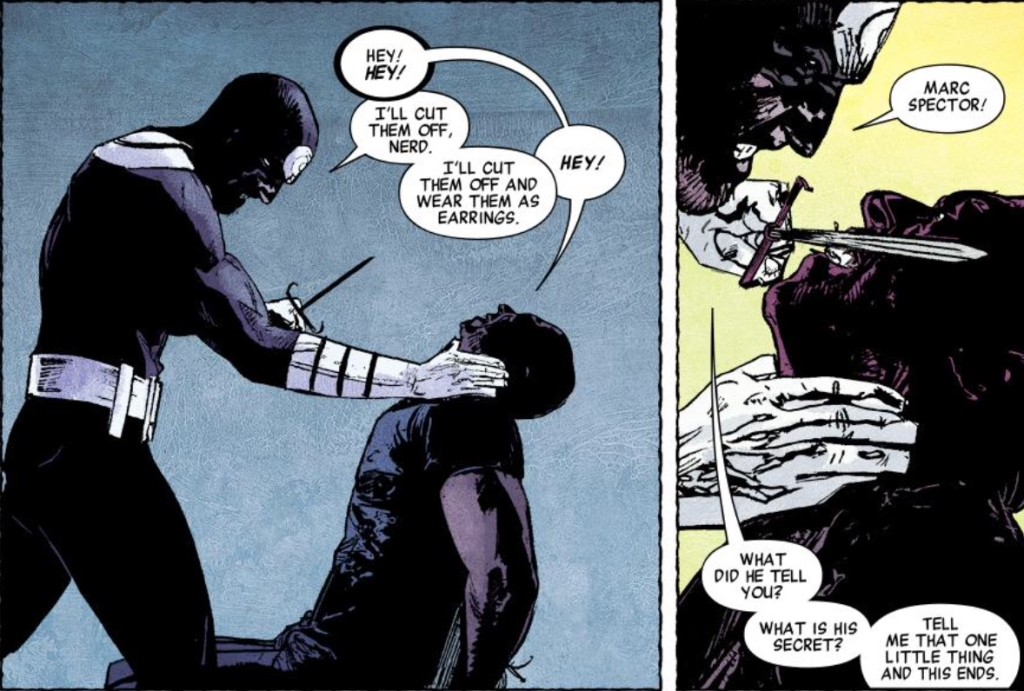
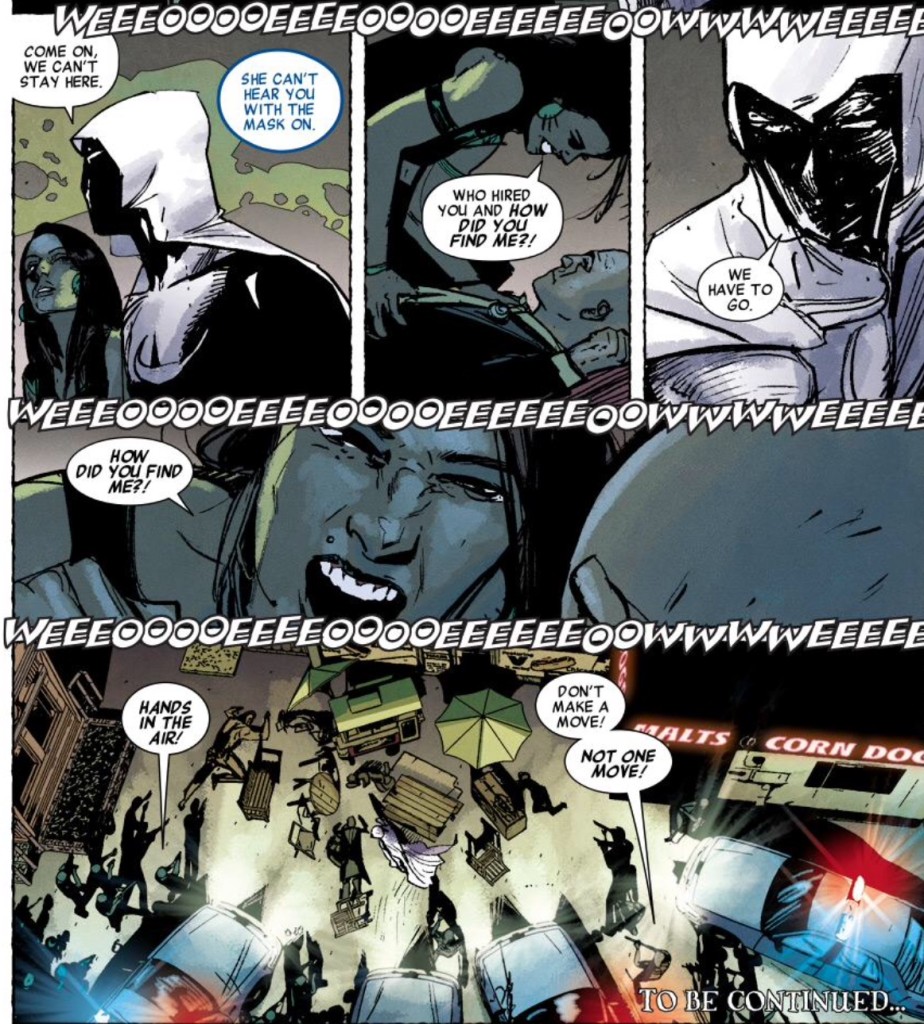
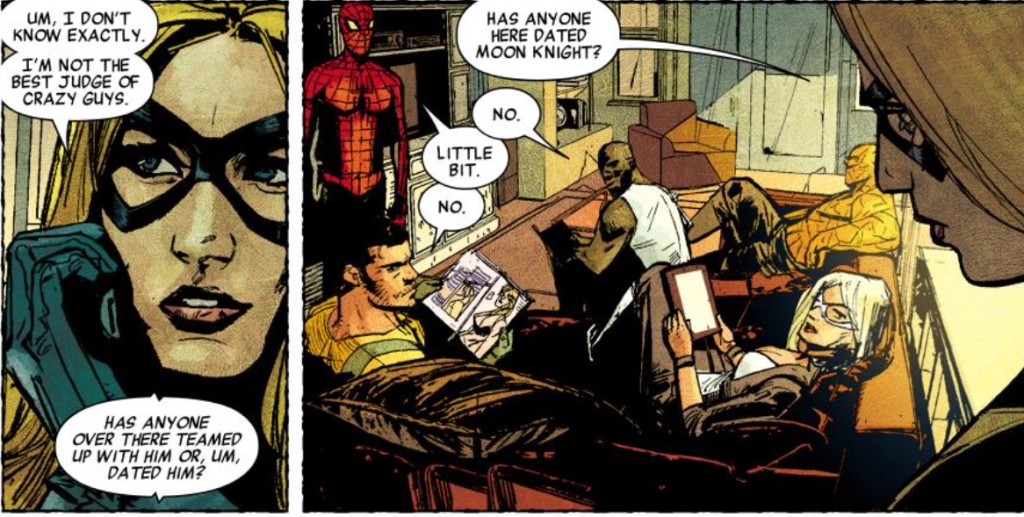


Not to be that guy but…Bendis’s Moon Knight launched in ’11 with Waid’s first Daredevil series and Rucka’s Punisher. Fraction’s Hawkeye launched the next year.
“obvious in its attempt to pander to their audience that it wished to be seen as a parody of pandering to their audience”
I still can’t decide if Dark Reign showed the degree to which Marvel’s editors and writers a)missed the point of stuff like Ellis’s Thunderbolts and Morrison’s Marvel Boy and/or b)have an ungodly amount of contempt for their audience. Probably a) and b), since I’m a cynic, but that’s still incredibly depressing.
“Smug complacency ”
That really does seem to be the mind set of most high level creators that work at Marvel, doesn’t it? And it seems that the only way to not fall victim to this mind set is to leave the company because that feels like the unofficial official company motto post-Civil War.
I used to be a big Bendis fan but at some point I really did get tired of reading the same thing over and over and over*, none of which would really come to any kind of satisfying conclusion either.
*Partly because he would literally repeat things he said in interviews in the very comics he was promoting, like word-for-word.
Arrghhhh….it launched in 2011? the damn Unlimited app listed it as 2012, I thought. Foo.
(Prefatory remarks written after the fact: Sorry in advance that my comment doesn’t really address your post, which I enjoyed greatly. I kind of get on a Bendis roll here.)
I’ve pointed this out many times before (although possibly not on this website), but it’s almost unreasonable to expect anything from Bendis circa 2009-2013. I say this not just because of his track record, but because of the fact that, at least during that period (and possibly still, I’ve stopped paying attention), he was turning out ten scripts per month in addition to Hollywood work, teaching, appearing at numerous conventions, and fulfilling his roles as Marvel Architect, as husband, and as father to several young children. It’s a simple math problem to see that he could not have devoted much time to any one script.
That being said, I jumped off the Bendis bus long before 2009. When I started picking up Ultimate Spider-Man trades as a teenager (2003 or thereabouts), it had a lot of things going for it. It didn’t read like anything else at the time, but still had this ambience of familiarity and nostalgia for me, having read Mark Bagley’s Amazing Spider-Man as a very young child. Plus, nerdy white teenager issues couldn’t have been more on point for where I was at. Even so, I didn’t make it past volume 7.
What was clear to me then in that title and has since become clear to me of all Bendis work is that there’s only ever the one mode. The gear never changes. If the characters or direction of the storyline don’t conform, their edges are sawn off to make them fit. A lot of writers have that “I’m telling one kind of story over and over” thing, and they can even be excellent writers (imo, with a thousand caveats, Morrison is essentially this kind of writer), but Bendis is special among them in that he will take on anything regardless of how much it disinterests him and/or jars with his aesthetic (e.g. a superhero with MPD), and even out of sheer carelessness bring his own characters and stories to places that disinterest him and/or jar with his aesthetic. Given enough time, Bendis will eventually write the complete works of Shakespeare, but only the scenes of Hamlet’s delay, with its bantering and tete a tetes, will be worth reading.
A limited range doesn’t have to be a bad thing. Look at Brubaker: crime, noir, horror-noir, spy-crime, superhero-noir, superhero-crime. Can you even imagine a Brubaker space opera?
(Gah. Now my brain is trying to insist that Thanos would work as a noir protagonist. Never let my brain write comics.)
Brubaker did space opera with his Uncanny arc. It was far from his best work but I’d put it above Bendis on GotG anyday.
I’d forgotten Brubaker did a X-run. Anything in there better than “far from his best”?
As for Bendis, at some point he’ll settle down to a reasonable workload and I’ll find out if the writer of Jinx, Alias, or early Powers is still in there.
Maybe not space opera, but I’d love to see Brubaker try a war comic.
That’s a great idea, Matthew. Although I think an extended period-piece murder-on-an-army-base story would be what I’d pull for from Brubaker. I think that would have the potential for so amazing work from him…
Great point about Bendis’s workload, Cass. It makes a ton of sense when you put it like that. And comparing him to a room full of monkeys with typewriters was fantastic, too.
Your timeline for giving up Bendis’ writing is pretty well the same as mine (I think I made it to issue 1 of Secret Invasion, though), along with your summation of what is probably his best work. But one thing I wonder is (to mirror Graeme’s entry below this) is the problem us, and not Bendis. Or, more particularly, is Bendis a victim of his own success. In short, by the time I give up Bendis I was Bendis-ed out and over familiar with his writing tics, to the point that I now find it really hard to re-read the Bendis work that I did like back in the day. Interestingly, the other writer this happened to was the equally prolific Chris Claremont. Is Bendis the 2000’s new Claremont, I wonder. But instead of excessive exposition and a repeated use of “I’m the best at what I do,” we have comic’s light Mamet dialogue and “Not like this!”
Having said all this, if they release a paperback omnibus addition of Alias to tie into the tv series, I’ll actually buy it. They probably won’t though. They seem to have released a paperback omnibus of the Pulse instead, which was a pale imitation of Alias.
Carey: First off, I misread your comment so I was quite excited to point you to the rereleased Alias omnibus…but it’s not paperback, and therefore not particularly cheap. It is good, though.
Comparing Claremont to Bendis is a great analogy (and I’ll throw in Smiling Stan as well) when talking about writers whose work can retroactively sour. That said, I do see glimpses of the Bendis I used to like, and still like. For me, I think Bendis’s success has forced him to make some decisions about his work, and I think some of those decisions have been to cut corners.
but I dunno. You could be right….
Have you read his x-men books? They are actually pretty great.
Agreed. Characters I’ve never cared about get their moments, and my favorites remind me why I love them. I can finally see the charm in 60’s-era X-men. Then again, Claremont X-men never did that much for me, so I don’t feel like Bendis is violating my childhood. Instead I get character banter that reminds me how much I love Justice League International.
Totally understand why some would dismiss anything Bendis. He definitely relies on his tropes, and keeps going back to his favorite tools in his fairly static arsenal. I also get that if he changed it up 180 degrees, he’d probably have a lot of fans calling for his head. None of it is high art, but his books are consistently more entertaining than that of most of his mainstream peers.
Miles Morales is still awesome, and tugs at my heart every month. Guardians is wacky and nerdy. I’m sure X-men isn’t going anywhere, but I love the ride. Similar to how I loved Aaron’s Wolvie & the X-Men. Not high art, but I keep coming back every month. And it’s not the EVERYTHING-YOU-KNOW-IS-WRONG or THE-HERO-HAS-NEVER-FACED-A-GREATER-THREAT bullpoop that’s made me weary of most other “successful” comics. Sure, that hyperbole is painted on his work by Marketing, but the books themselves seem completely ignorant of any marketing promises.
That said, never read his Moon Knight. So you might be right on the money regarding that one.
And regarding hearing his interviews, and seeing those quotes spoken by characters — I suspect he wrote the dialogue first, and it’s an easy go-to during interviews.
Even given all his flaws, “smug” “complacent” “bad” and “lazy” seem pretty harsh accusations coming from someone worshiping at the altar of Englehart :P
Wish I could delete that reply. No need to bash anyone else, in an attempt to make a point. Any “post comment” button needs a lag time, with a “read this again and think twice” warning before it shows the “OK, really post this” button.
Oh, shoot. I can’t quite tell what you’re referring to here on the comments dashboard but if you’re serious about wanting a comment deleted Das, drop me a line a pig[DOT]latin[ATT]gmail[D0T]com and I can delete any comment of yours for you that you want, if you want.
Wait, are you talking about that one casual aside about Claremont? Because that is the gentlest bash ever if so (and especially by Internet standards).
Nah, I felt guilty implying that Englehart was also smug, bad, and/or lazy. Should’ve just ended the sentence with “…seem pretty harsh accusations.” period.
You can call a creator’s work smug, lazy, and complacent without calling the creator themselves smug, lazy, and complacent. While many online commentators don’t know or care about the difference, it is important, because we generally don’t actually know these people and have no reason to judge their motivations and character. Whatever I may or may not think about Bendis’ writing, I don’t know him as a person, except for comments in interviews that are no more an accurate representation of his character than any other advertisement. I do know that his stories (for Marvel at least) tend to have monotonous dialogue that doesn’t really vary by different characters, scenes that have no purpose for the story or characters and seem pointless even by Seinfeld standards, disappointing resolutions that just end up as previews for other stories, and plot structure that uses super-power/time-travel as an excuse to use deus ex machina logic for any and all situations. Those are characteristics of a story that I would call lazy, regardless of wether or not the writer behind them was half-heartedly churning them out in a half-hour or laboring extensively over every word.
“By which, I mean that, if memory serves, Moon Knight was a little more of a thug in his first appearances in Werewolf by Knight…”
I’d read ‘Werewolf by Knight’, the ongoing adventures of a knight turned into a werewolf.
Ha, ha, ha! Oh, man. What a simpleton I am. Thanks for the catch, Ben. (Also, I’d probably read that, too.)
I read part of this at one time and thought it somewhat worked as a comedy, but completely ruined the character.
But yes, I tend to look for Bendis on creator-owned work only at this point. The X-Bendis volumes I’ve gotten from the library are uneven. Every other one is good, but not usually 2 in a row.
Marvel Now!!!!!!!!!! was pretty damn good as a bunch of titles, but only Bendis on X-Men made me think, FINALLY, that makes a lot of sense.
First thing in a long time I dig from Bendis. He’s not a very versatile creator, but when he’s on the right project, it just works for me.
Ok, here’s my question; how many times does Bendis use the word “break” (specifically the adjective form “broken”) in this series? Because he’s been using that word a lot in his recent projects, to the point where I not only notice it but become irritated that his vocabulary is as varied as Bane’s….
At this point, the only thing I think of when I think of Bendis is Jesse from Breaking Bad screaming “HE CAN’T KEEP GETTING AWAY WITH IT!”